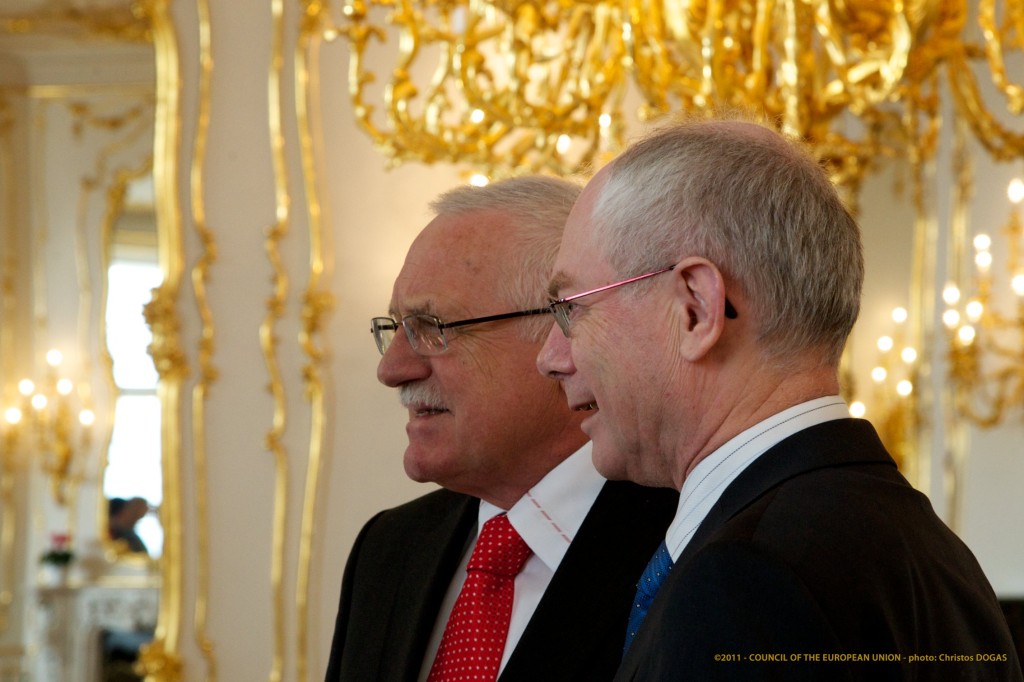The head of state, known for his Euro-scepticism, has ruled out a short-term adoption plan and even, perhaps, for the future.
He has been called Euro-sceptic and defined as the Mr. no of Czech politics , but also a peacemaker or negationalist of climate warming, prime minister and finally, an economist. For many people, he is more than just a head of state, for some, (most of the time) he is the true direct or indirect architect of Czech Republic foreign policy. His name is Vaclav Klaus. As they often say, when referring to self-centred and harsh characters, you either love or hate them and, this is exactly how things stand with the Czech President. Guarantor of the institutional role and Czech sovereignty against those who want to deprive Prague of its powers – an uncompromising attitude and obstacle towards true European integration, according to others. During Klaus’s presidency, most probably, the highest moment of tension with Brussels was reached during the ratification of the Lisbon Treaty, when the head of state was last in placing his signature and, following many long negotiations and reassurances on the part of European partners.
Now on the horizon, there looms another possible reason for tension with Brussels: the euro.
That the Czechs were not fond of the single currency was well known and, that the political parties wished to postpone the argument as much as possible, was quite clear, despite requests from the industrial sector in favour of a quick adoption. But, the idea that Prague wanted to line up with Great Britain and Denmark – the member states firm on not giving up to the Euro-zone , had not been so obvious until the end of last year. The promoter of this wave of Euro-scepticism is Klaus himself. The head of state has remarked, leaving no room for further digressions or comments, that none of the main institutions of the Country has in mind a plan for the adoption of the euro and that, in any case, this would not be the right moment for dealing with such an argument, especially after the Greek financial crisis – that has shown the weakness of the system. The same scepticism was professed for the ratification of the rescue mechanism wanted by the EU, which Klaus has not yet signed, and on which he has expressed many doubts.
From Hradcany, the Czech president has also made his first move in that direction, also treading on the feet of Karel Schwarzenberg, responsible for foreign relations: the head of state expressed his hope that the government of Petr Necas will negotiate with Brussels on the right to recede from the adoption of the euro. News provided only anonymously by two ministers of the same Necas government. The premier himself has said that, beyond any reasonable doubt, his executive will not adopt any deadlines for entry into the Euro-zone, even in view of the fact that 55% of Czechs are against giving up the crown.
Over the years, this aspect – as well as other issues – has caused a certain amount of friction and misunderstanding between Klaus and the Foreign minister, responsible for Czech diplomacy. The political analyst, Bohumil Dolezal, has underlined that this division may create a break up within the government coalition because, “the president is convinced that, in view of his relationship with Vaclav Havel, Schwarzenberg will have a less rigid position with the EU”. Furthermore, for Klaus, Top09 – the minister’s party, represents “the number one enemy “and Schwarzenberg “is its symbol”. Finally, the responsible official for Czech diplomacy is “more of a representative figure rather than one of action, respectful of the Constitution – Dolezal added – more suitable for the position of president”. Just this “status” might suggest a candidature of the minister for t he seat of president, a hypothesis that Klaus might try to sabotage.
Therefore, with reversed roles , Klaus continues to exert his influence on foreign and monetary policies, as he did in the past few months and years.
And even at home, on the Czech political scene, the head of state has shown his political weight, during a government crisis at the end of the year, when the Czech president was able to avoid the voting of the motion of confidence to bring down the centre-right government, that had been presented by the Social-democrats, following an attempted bribery scandal that led to the dismissal of the Environment Minister Pavel Drobil .
Klaus summoned the leaders of the three parties of the coalition and with an unexpected move, during the meeting at the Prague Castle: he convinced them to stipulate an agreement for the stability of the majority. A non written agreement to which he “bound” himself and, for which he could be denounced by the head of state if he were to infringe it. A reassurance that was adequate also for the Cssd, despite initial doubts.
If anyone should still doubt if Klaus knows what he wants and how to go about achieving it, he need just wait for the next clash to take place, both in Prague and in Brussels.
By Daniela Mogavero





